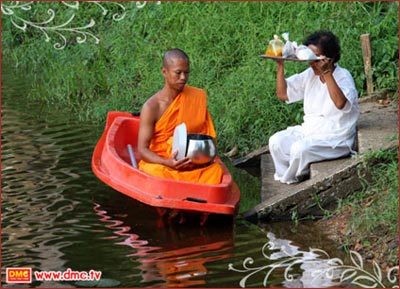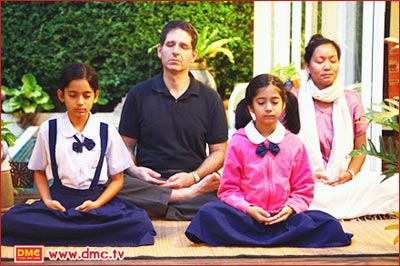Complete Criteria in Giving
Generally, Buddhists are fond of giving to monks and virtuous persons regularly.
Today, most people are inclined to put their faith in science above anything else. However, science can only prove what the eyes can see. There are so many things that the eyes cannot see whose existence is unverified by science.
For example, our mind and the physical heart are two different entities. When we feel sad or glad, these feelings are not from the physical heart, but from our ethereal heart. Science still cannot describe what the ethereal heart looks like or where it resides. We do not know where feelings come from; we just know that they are there.
The physical heart is an organ. Nowadays, doctors can stop the beating of the heart while operation on a patient with heart problems and able to restart the beating once the operation is finished. If the physical heart and the ethereal are the same, the patient would have died. This should prove that the physical heart and the ethereal heart are two different things.
In the Tripitaka, the Lord Buddha spoke of a number of subjects that were unknown to science at the time. He said thousands of years ago there was more than one universe; actually there are an infinite number of universes. Scientists only came to discover this fact a few hundred years ago.
The Lord Buddha had also explored the concept of merit. And it would be deplorable if we rejected this idea outright. We should learn about it with open minds since it directly affects our lives. We cannot see it, but we can feel it within us. We should support Buddhism and study the Tripitaka to enhance our knowledge, and then we would not be labeled as Buddhists only in name.
Based on this belief, the writer has faith in merit and demerit. Unfavorable outcomes are the consequence of bad actions. This is the law of kamma. And in times of trouble, we can look for help, not in science, not in economics, and not in politics, but from good kamma to aid us.
Adherence to the precepts. This means to keep under control our actions
and speech so that they do no injure others and us.
In the chapter, “The Correct Way to Gain Merits” from the book Good Question, Good Answer by Venerable Phrarajabhavanaviriyakhun, the issue of merit was discussed in detail as follows:
“The Lord Buddha stated that there were three methods of gaining merits, namely through acts of generosity, adherence to the precepts, and meditation.
1. Generosity. This is the sharing of useful things with those who are deserving. However, it should not be done to our detriment. Generally, Buddhists are fond of giving to monks and virtuous persons regularly.
2. Adherence to the precepts. This means to keep under control our actions and speech so that they do no injure others and us. We should observe at least the Five Precepts. And when the opportunity arises, such as the day before a Buddhist Holy Day, a Buddhist holy Day, and during weekend retreats, Buddhists can choose to observe the Eight Precepts to gain addhists can choose to observe the Eight Precepts to gain additional merits. Some people even choose to observe the Eight Precepts one day a week on a regular basis.
3. Maditation. This is the way to purify the mind. Study Dhamma and chant to calm and purify the mind every night before bedtime for at least twenty minutes to one hour.
Some people establish routines to ensure they accumulate these three merits:
- In the morning, I will not eat before I have performed the merit of giving.
- Today, I will not leave the house before I have resolved to observe the precepts.
- Tonight , I will not go to bed before I have recited the mantras and meditated.
If a person can follow this routine consistently, he can be sure that his life will never lead to despair. The future will be bright. All three will gradually advance the purification of the mind to a higher level. If our mind is clear and bright, we will feel joyful. In a happy mindset, we will think right, speak right, and do the right thing.
As a first step to gain merit, I suggest first practicing generosity.
Maditation. This is the way to purify the mind.
The Lord Buddha stated that to gain the maximum merit, giving should meet these four criteria, namely:
1. Wholesomeness of the object. The object to be given must be obtained legitimately and morally, not through fraudulent means.
2. Upright intention. The objective of giving is to get rid of miserliness, selfishness, and greediness. It is not done to gain riches, renown, or recognition. The true intent is to share and gain merit. Gaining merit is not greed; it is actually replacing greed with generosity.
3. Conscientious donor. The donor should at least abide by the Five Precepts. And it is important that he should be joyful before, during and after the offering, and not feel regret about it.
4. Virtuous recipient. If the recipient is an enlightened monk, the merit will be enormous and instantaneous; the effects of that merit will be realized in the present lifetime. But if the recipient monk is not yet enlightened, he should at least be striving towards that goal. If he is a layperson, he should adhere to the precepts.
In addition to the criteria for giving, the Lord Buddha also provided several illustrations.
Some illustrations that He imparted to the monks confirmed that the outcome of giving depends on the four criteria, and that their effectiveness has to do with how well each of the criteria were met in each instance. The more virtuous the criteria were met in each instance. The more virtuous the recipient, the more merit as a result, And if the recipient is single-mindedly striving toward enlightenment, the benefit to the generous person will be immense and immediate. I want you to read the Tripitaka, the Suttantapitaka, such as Kuttakanikaya Vimaanvattu, to see if my observation is correct.”
The section from Good Qood Question, Good Answer by Venerable Phrabhavanaviriyakhun as quoted in this chapter gives insight and encouragement to readers to make merit and to cultivate this habit in their own children while the children are young. And at the final hour of our lives, no matter how educated we are or how much money we have, only our spiritual merits can help us.
Merit is not for sale. If you want it, you will have to acquire it yourself through your own actions.
Meditation - Related Articles
" />
" />
" />
" />
" />
" />
" />
" />
" />
" />
" />
" />








